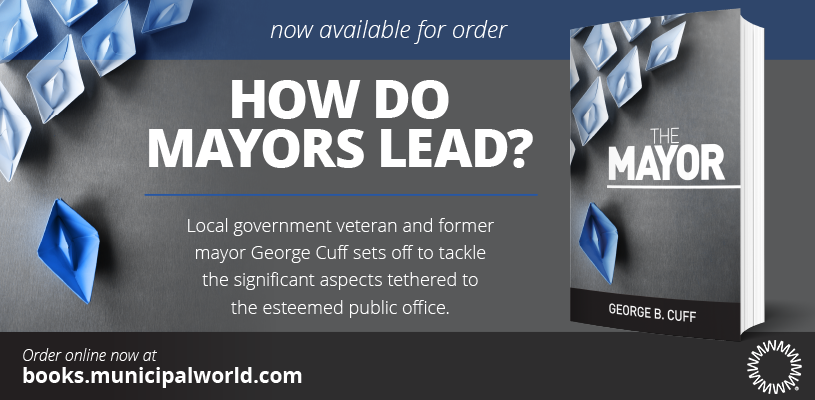Navigating the trade war: Municipalities caught in the crossfire
 At the recent Association of Municipalities of Ontario conference in Ottawa, economist Tony Stillo delivered a sobering message to local government leaders – trade tensions with the United States are already harming Canada’s economy. Photo: BNN Bloomberg YouTube
At the recent Association of Municipalities of Ontario conference in Ottawa, economist Tony Stillo delivered a sobering message to local government leaders – trade tensions with the United States are already harming Canada’s economy. Photo: BNN Bloomberg YouTube
In a time of economic turbulence, municipalities across Canada are grappling with the ripple effects of global trade tensions.
At the recent Association of Municipalities of Ontario (AMO) conference in Ottawa, Tony Stillo delivered a sobering message: trade tensions with the United States are already harming Canada’s economy. And Stillo – director of Canada Economics at Oxford Economics – said municipalities are feeling the brunt.
“The trade war is causing damage to the economy and to local economies,” Stillo said. “Trade policy uncertainty alone is already causing a degree of harm.”
Recession or Not, the Pain Is Real
Stillo urged municipal leaders not to get distracted by technical debates.
“Don’t get caught up in the little specifics of recession, no recession,” he said. “In our view, the trade war recession – if it’s a recession or downturn, all those technicalities aside – has already started.”
According to Oxford Economics, the contraction began in the second quarter of the year and is continuing into the third. This contraction is driven by reduced exports and lower business investment.
Stillo warned that trade-dependent communities like Windsor and Hamilton are especially vulnerable.
“It’s going to hit the ones that are dependent on manufacturing and exports to the U.S. more than, say, an economy like Toronto,” he explained. “Toronto’s much more diversified … it’s got stronger business services and financial services, and a large public sector, so it cushions the blow.”
Facing Down the United States
The conference included a keynote address from political columnist Andrew Coyne and a speech from Ontario Premier Doug Ford. Both took direct aim at U.S. President Donald Trump while cautioning local government leaders to not get caught up in the daily media assault the U.S. leader uses to deflect the issues at hand.
Stillo acknowledged the complexity of trade tariffs, noting that the U.S. administration’s actions extend beyond trade, citing concerns such as illegal immigration, fentanyl, and NATO defense commitments. Stillo emphasizes the importance of focusing on local needs and leveraging available support, such as the federal counter-tariff program and provincial aid for industries like steel.
Municipalities, he explained, face unique financial constraints.
Local governments can’t go into debt and deficit, Stillo said, adding that the senior orders of government must step up – and they have been. He added that to help local governments assess the impact of tariffs, a tool was provided to AMO by Oxford Economics that estimates cost implications for capital projects.
“It’s a tool … so they can look at their specific projects and say it’s going to be a road or it’s going to be a swimming pool or a school, or whatever, and say this is all the inputs that go into that,” Stillo said. “And we’ve given them that tool. It’s a very fluid environment, but I’d say use that and try to figure out what the cost is.”
Bracing for Economic Headwinds
Stillo said Canadian municipalities must prepare for a period of economic turbulence as trade tensions, shifting immigration policies, and delayed federal fiscal planning converge to create a challenging landscape.
Stillo emphasized that if trade disruptions deepen into a broader economic downturn, municipalities will be hit hard. Reduced revenues from housing and local activity could coincide with rising costs, particularly as tariffs drive up prices.
“That’s really a war on two fronts,” Stillo said, adding that the Bank of Canada is somewhat “caught in a bind” as it tries to keep prices and inflation stable.
Compounding the uncertainty is the absence of a spring federal budget. Stillo expressed concern that municipalities are operating without a clear fiscal roadmap.
“It would’ve been nice to have seen more in a full platform while the economy’s been hit now,” he said. “Yet we’re going to have to wait till the autumn before we get the details of what the federal government has in mind.”
While recent federal announcements – including tax breaks and increased defense spending – offer some relief, Stillo said they fall short of a comprehensive strategy to stave off recession. Defense spending, he added, may offer unexpected benefits such as investments in dual-purpose infrastructure such as ports and transportation corridors that could support local economies.
Immigration policy is also undergoing a dramatic shift. After years of rapid population growth, the federal government is now curbing temporary resident inflows, a move that has already begun to ease rental pressures.
“We went cold turkey. We went full bore on this massive inflow, and then we’re trying to turn it around real quickly,” Stillo said. While the change may ease some infrastructure strain, it poses challenges for sectors like post-secondary education, which have relied heavily on international students.
Oxford-AMO Collaboration
Oxford Economics has been working with AMO for a while now. As such, Stillo said the collaboration has proven helpful in supporting local officials as they navigate turbulent economic conditions.
Stillo acknowledged the value of bringing economic modelling into the hands of those dealing with real-world challenges.
“These are councillors, mayors, all those local officials that are dealing with things right on the ground,” Stillo said. “Here I am as an economist in my ivory tower with our models and saying, ‘Here’s what we think is going to happen.’ But it is important for them to understand the world they’re operating in; what this sort of next couple of years – in this case, hopefully, just a short-term period – could look like, and it could be rough waters.”
While economists often operate from a theoretical vantage point, he stressed the importance of contextualizing forecasts for municipal leaders grappling with immediate pressures.
The Oxford-AMO collaboration, according to Stillo, is helping local leaders understand these dynamics and prepare for the economic implications ahead. By translating macroeconomic trends into actionable insights, the partnership aims to empower communities to make informed decisions in a time of uncertainty.
Municipal Reform is Essential
As Canadian municipalities face mounting infrastructure demands and economic uncertainty, experts from AMO – as well as their counterparts at the Federation of Canadian Municipalities – are renewing calls for comprehensive fiscal reform to equip local governments with modern revenue tools.
Stillo agreed, emphasizing the urgent need to revisit Canada’s outdated fiscal framework and arguing that municipalities are being asked to tackle 21st-century challenges with 19th-century tools.
He noted that property taxes – the primary revenue source for municipalities – come with significant trade-offs, especially for residents on fixed incomes.
“Comprehensive tax reform, including revisiting the fiscal framework across all orders of government is long overdue,” Stillo said, pointing to the last major overhaul – the Royal Commission and McDonald Commission of the 1980s – as insufficient for today’s rapidly evolving economy. “Municipalities should have a better stream of revenues than just the ones they have now.”
Beyond domestic fiscal challenges, Stillo also addressed the broader economic context shaped by shifting trade relations. He pointed to the fallout from the U.S. trade war as a wake-up call for Canada to diversify its markets and strengthen internal trade.
But, he added, this effort must come from a network perspective. It can’t be one small town trying to fight the big fight.
Stillo said diversifying the country’s markets for trade beyond the U.S. – away from the “all our eggs in one basket” approach that led to the old Canada-U.S. free trade approach – created significant advantages. But, he added, Canada is somewhat paying the costs of that approach today.
Homogeneous products, such as oil and other natural resources, are ones Stillo believes Canada can find alternative markets for relatively quickly. It won’t happen overnight, but he said it will happen more quickly than what could be a diversification of trade to other markets for more specialized products.
“I hope individuals and companies are taking advantage of it because it’s there for them,” he said. “And is it a long enough period? Probably not, but it’s definitely a step in the right direction.” SM
✯ Municipal World Executive and Essentials Plus Members: You might also be interested in Kumutha Ramanathan’s article: With inflation waning, Canada’s economic slowdown will define 2025.
Sean Meyer is digital content editor for Municipal World.
Related resource materials:



